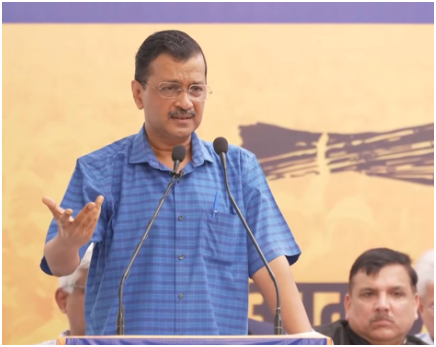In a recent exchange between Prime Minister Narendra Modi and Delhi Chief Minister Arvind Kejriwal, tensions flared over the Ayushman Bharat health cover scheme, highlighting the political friction between the two leaders. During a public event, Prime Minister Modi criticized the Delhi government’s healthcare policies, asserting that they had not effectively utilized the Ayushman Bharat scheme to benefit the city’s residents. He emphasized that the program, which aims to provide comprehensive health coverage to the economically weaker sections of society, has been successfully implemented in various states across India but has not been adequately leveraged in the national capital.
In response to the Prime Minister’s remarks, Arvind Kejriwal defended his government’s record, asserting that Delhi has made significant strides in healthcare access and quality. He described Modi’s comments as “not right,” contending that the Delhi government has consistently worked to improve health services for its residents. Arvind Kejriwal argued that the criticism was politically motivated and disregarded the challenges faced by the city, particularly during the COVID-19 pandemic. He reiterated that Delhi’s healthcare system has been bolstered through various initiatives, including the introduction of Mohalla Clinics, which have garnered attention for providing free and accessible primary healthcare.
The Ayushman Bharat scheme, launched in 2018, is one of the flagship initiatives of the Modi government aimed at providing health insurance coverage to over 500 million people in India. It offers up to ₹5 lakh per family per year for secondary and tertiary care hospitalization. While the scheme has received praise for its intent and reach in many states, its implementation in Delhi has been a topic of debate. Critics argue that bureaucratic hurdles and lack of awareness among beneficiaries have impeded the scheme’s effectiveness in the capital.
Modi’s comments also coincided with a broader narrative about the performance of state governments in implementing central schemes. The Prime Minister has repeatedly highlighted the importance of cooperative federalism, urging states to take a proactive approach in executing national programs that benefit the populace. This discourse is particularly relevant as elections loom, with both the Aam Aadmi Party (AAP) and the Bharatiya Janata Party (BJP) gearing up to contest for voter support in the upcoming polls.
Arvind Kejriwal defense of his government’s healthcare initiatives is part of a larger strategy to position the AAP as a viable alternative to the BJP in Delhi. The Chief Minister has emphasized the need for a robust healthcare infrastructure, particularly in the wake of the pandemic, which exposed the vulnerabilities in the existing system. His administration has focused on improving hospital facilities, increasing the number of healthcare workers, and ensuring that essential services remain accessible to all citizens.
This exchange between Modi and Arvind Kejriwal reflects the ongoing political tussle between the BJP and the AAP, with both parties seeking to gain an upper hand in public perception. The Delhi government has accused the central administration of withholding funds and resources, which they claim hampers the delivery of essential services. In contrast, the BJP has criticized the AAP for alleged mismanagement and inefficiencies in governance.
As the debate continues, Arvind Kejriwal the focus on healthcare remains critical for both leaders. With the pandemic underscoring the importance of effective health systems, how each government addresses these issues will be scrutinized by voters. The political rhetoric surrounding the Ayushman Bharat scheme will likely intensify as both sides seek to leverage their narratives to gain public support.
In conclusion, the exchange between Prime Minister Modi and Chief Minister Arvind Kejriwal over the Ayushman Bharat scheme serves as a microcosm of the broader political dynamics at play in Delhi. As both leaders navigate the complexities of governance and public health, the impact of their policies will resonate with citizens, shaping the future of Delhi’s healthcare landscape and influencing voter sentiment in the upcoming elections. The ongoing dialogue highlights the critical intersection of politics and public health, with the stakes higher than ever as the city continues to emerge from the shadows of the pandemic.
Stay informed with the latest updates – click here .

